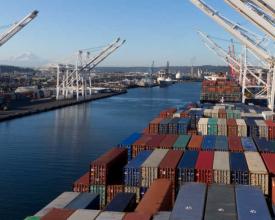DHA eNews – Floor Daily Highlights DHA's Request To Add Hardwoods To Section 232 Tariffs
As of today, the shutdown of the federal government continues, limiting activity here in Washington, DC, to those things considered essential. Fortunately, preventing wildfires and getting EPA out of the way of prescribed burns have passed the essential test, as have timber sales.
The Section 232 tariffs on cabinets and furniture kicked in on October 14. The U.S. cabinet industry could really use the help, with sales down by nearly 15% through August. Reports suggest that IKEA is looking to increase U.S. production to avoid tariffs.
If you have questions or comments, contact me. I look forward to hearing from you.

Keith A. Christman, President

On October 8, Kemp Harr of Floor Daily and Keith Christman, President of Decorative Hardwoods Association, discussed the difference between the reciprocal tariffs established under the International Emergency Economic Powers Act (IEEPA) and Section 232 tariffs. They also discussed what DHA is doing to protect U.S. manufacturers from illegally dumped and subsidized imports of hardwood products, including flooring.
PHOTO © JERRY GLASER
U.S. forest products associations urged the European Commission to "avoid a rushed process and take the time necessary to pursue simplification [of the EU Deforestation Regulation] with great care. An additional year provides a valuable opportunity for the Commission to engage in productive dialogue with forest owners and operators in highly forested, low-risk countries like the U.S. to understand implementation challenges and reduce unintended consequences."
Now, however, the EC is proposing that the EUDR take effect for large producers on December 30. Small and micro producers will still have until December 30, 2026, to comply.
On October 14, the Hardwood Federation sent a letter to Trump administration officials, making the case that U.S. hardwood companies should be included in any trade assistance programs involving agricultural industries that have been negatively impacted by trade and tariff policies. More than 430 hardwood mills, manufacturers, yards, logging companies, and suppliers signed the letter.
As of today, the Congressional stalemate over funding federal government operations continues. The Senate has held numerous votes on the continuing resolution passed by the House; the votes have failed due to a Democratic filibuster. Senators Fetterman (PA), Cortez-Masto (NV), and King (ME) are the only non-Republican Senators who voted for the measure. So far, no compromise is in sight. We will keep you apprised of developments.
Trees in three national forests in Oregon will be auctioned off for logging by the end of the month, even though the federal workers preparing these timber sales are not getting paid and many of their colleagues in the U.S. Forest Service are furloughed. Staff who organize and process timber sales have been designated as essential workers.
As the European Commission continues to struggle to implement the EU Deforestation Regulation, the American Hardwood Export Council and its partners have developed a feasible approach to implementation. AHEC proposed that county-level geolocation should be enough for U.S. hardwood exports to comply with the EUDR. Per AHEC's careful analysis, this would still meet all EUDR objectives for mitigating the risk of deforestation.
Last week, the World Container Index, which measures container freight rates, rose by 2% to $1,687 per 40-foot container. This marks the first weekly increase since May. The index is at its highest level in more than a month, though still down by 48% vs. last year. Rates to U.S. ports increased by 1%.
The latest round of President Trump's tariffs went into effect on October 14, imposing duties of 10% to 50% on imports of wood products and furniture, including upholstered seating and cabinets. The Home Furnishing Association urged members to review sourcing and pricing ASAP, as landed costs are likely to increase by 10% to 25% or more. Retailers may need to reassess supplier contracts, adjust pricing, or source from countries with lower rates.
We regret to inform you that Terry Ostrander passed away on September 23 at the age of 63. Terry had a successful career in our industry, including nearly two decades as a sales manager at DHA member Timber Products. His work was always about more than just business — it was about relationships. Whether with colleagues or customers, Terry's generosity, kindness, and genuine interest in others left a lasting impression. He will be missed by his family, friends, Timber Products colleagues, and all of us at DHA.
After months of declining cabinet sales, cabinet volume grew in August, up by nearly 8% vs. July. However, year-to-date sales are still down by nearly 15% through August. U.S. manufacturers have been hit hard by imports. Section 232 tariffs of 25% on imports of cabinets began on October 14.
IKEA, the world’s largest home furnishings retailer, plans to increase its U.S. manufacturing after President Trump levied tariffs on imports of furniture and kitchen cabinets. IKEA sold about $5.5 billion in home furnishings in the U.S. last year, but produces only about 15% of those products in the U.S.
Capital Testing has published an easy-to-skim, comprehensive overview of formaldehyde emissions standards and requirements for composite wood products. See the Capital Testing website for more details, or contact the team to learn more.
On October 16, the U.S. Environmental Protection Agency told regional offices to remove barriers in State Implementation Plans that discourage prescribed fires. In the past, some states included air quality provisions that prevented some prescribed fires in areas vulnerable to catastrophic wildfires. Prescribed fires are a strategic tool used to help prevent fires and protect homes.
In Queensland's wet tropical rainforests, the woody biomass of trees has shifted from being a carbon sink to a carbon source. A new study that analyzed nearly 50 years of data across 20 sites suggests that carbon is being emitted, as trees are dying and decaying faster than they can be replaced.
Where are tree seeds stored, frozen, in a vault, in case of a catastrophic disaster?





